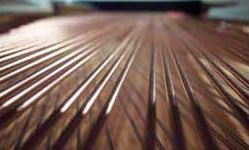
It’s all about HUMIDITY! An acoustic piano is largely made of wood, felt, and metal. Wood and felt are effected by humidity changes. Too much dampness can rust metal tuning pins and strings. We’ve all noticed how a wood door will stick in the summer, but works fine in the winter. The same thing happens to a piano. The spruce sound board swells up in the summer making the piano go sharp in pitch and the reverse in the winter. You can also have key and action friction due to these swings in humidity. How do you combat humidity changes? You need to keep the room the piano is in at a humidity range of 35% to 55% at room temperature. Keeping the room air conditioned in the summer will knock out a lot of the humidity. Running an evaporative room humidifier during the heating season will provide the needed moisture. You will need a hygrometer to measure and track your humidity. Radio Shack sells a digital one that’s reasonable. If an air conditioner and humidifier is not possible, then I strongly recommend having a piano technician install a climate control system (made by Damp Chaser) in the piano. It does a good job at minimizing these changes. This means the piano will stay in tune longer and the pitch will be more stable. The system has an advantage in an upright because it is completely inside the case which is closed to air movement. The system has to be installed under the sound board of a grand which can be subject to some air movement. An optional cover makes the system more effective. Also keep in mind that in a grand the system will do nothing for the action and pin block area. This where controlling the room humidity is needed.
There are other things to consider in taking care of a piano. Avoid sunlight hitting the piano. It damages the finish. It will fade wood stained finishes. It can also effect tuning stability if the piano is in strong sunlight. Avoid open windows near a piano. They can let in very humid air which can rust and tarnish tuning pins and strings especially in a grand piano. Keeping the lid open on a grand piano looks nice, but when your not playing it put it down and close it completely. This means folding the small lid closed as well. This keeps the interior on the grand looking nice for a much longer time. It is very discouraging to see a piano I recently rebuilt have rust on the tuning pins and strings, cobb webs all over the interior, and mildew on the sound board. I’ve seen pianos that look like they’ve aged forty years in just four years! Another thing I recommend is a string cover. It is a felt panel with pockets sewn into it that have dowels to keep the cover suspended above the strings. It really protects the whole interior of the grand piano while also allowing it to be played. Remember, the way a piano looks can really effect it’s value!
Taking good care of a piano is a little like having a horse in your living room. It’s going need continual care, but you can avoid costly repairs and maintain a good resale value. It will sound and perform well if you take my advise.

Leave a Reply